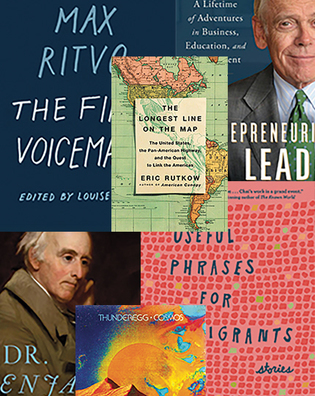 loading
loading
Arts & CultureOutputTo have your book, CD, app, or other work considered for Output, please send a copy to Arts Editor, Yale Alumni Magazine, PO Box 1905, New Haven CT 06509; or e-mail a copy or link to yam@yale.edu.  View full imageDr. Benjamin Rush: The Founding Father Who Healed a Wounded Nation Among the 56 signers of the Declaration of Independence, Benjamin Rush was the only one with a medical degree.* Unger, who has written several books about the founding fathers, calls Rush “the nation’s first great humanitarian.” Rush advocated against slavery and on behalf of women, the working poor, and the mentally ill. While his medical care—based on purging and blood-letting—was suspect even then, there’s no denying his courage, especially during the 1793 yellow fever epidemic in Philadelphia.
The Longest Line on the Map: The United States, the Pan-American Highway, and the Quest to Link the Americas “The longest road in the world” is the Pan-American Highway, writes Rutkow; it runs almost 14,000 miles, “from Prudhoe Bay in Alaska to Tierra del Fuego in South America.” There’s a footnote: a 60-mile stretch through the Darién Gap, an environmentally and culturally sensitive Central American rainforest, will likely never be finished. And the road has remained incomplete in subtler ways. As Rutkow shows, it was meant to be the concrete and asphalt embodiment of Pan-Americanism—the dream that “the Americas shared a common destiny.”
Entrepreneurial Leader: A Lifetime of Adventures in Business, Education, and Government Bill Donaldson, the founding dean of the Yale School of Management, has made a significant mark in government, business, academia, and the nonprofit sector. From crafting an iconoclastic investment firm to chairing the Securities and Exchange Commission, his mantra has been “entrepreneurial leadership.” It started when he had to confess to shoplifting as a kid. His book tells how it played out.
Useful Phrases for Immigrants: Stories When her discount coupon for plastic bins was rejected at the office supply store, Guili, a recent immigrant from China, requested a “rain check.” It was one of the supposedly “useful phrases” she’d learned from a book about American English, but, like many of the promises and hopes in this short story, it failed. There are eight stories in Chai’s book, each about Chinese immigrants and their families; together, they illuminate some of the complexities such families face. But then, few close relationships are simple. Chai’s insights into the bittersweet dynamics of the family are exquisitely rewarding.
The Final Voicemails “Sometimes I can almost feel / What the world would be like without me,” wrote Ritvo, a poet who succumbed to cancer three years ago. His teacher and friend Louise Glück, the Rosenkranz Writer in Residence at Yale and former US poet laureate, edited this last of his works; she calls it “so urgent, so daring, so supple, so desperately alive.” The result is that Ritvo’s poetry remains with us. As he notes in the book’s title poem, “I know you’ve been waiting for disintegration / but it just doesn’t seem to be coming.”
Cosmos Thunderegg is a true survivor of the collegiate indie-pop boom of the 1990s, with a global cult following and a dedicated, prolific leader in Georgantas. It began as an offshoot of a Yale undergrad band called Larry, then became Georgantas’s solo project before expanding in 2000. Now based in San Francisco/Oakland, Thunderegg has 20 albums, including useful anthologies of their diverse low-fi-to-hi-fi history. Cosmos is a dreamy and delirious feast of psychedelic pop, 11 songs in all. “Stupid Town” has an ’80s new-wave thump; “Math Song” has a childlike innocence reminiscent of Jonathan Richman. Thunderegg really comes into its own on gentle, literate tracks such as “Pleasant Hill,” “I Almost Cry,” and the two-part “Planetarium”—songs with such deep, sharp, detailed lyrics that they’re practically short stories. ________________________ * In our print edition and in an earlier version of this article online, we reported that Benjamin Rush was the only medical doctor to sign the Declaration. There were in fact four doctors who signed, but Rush was the only one with a medical degree.
The comment period has expired.
|
|